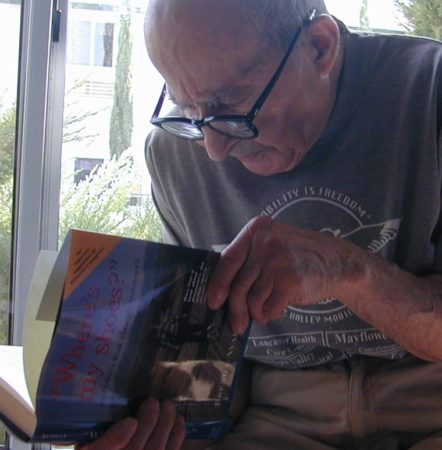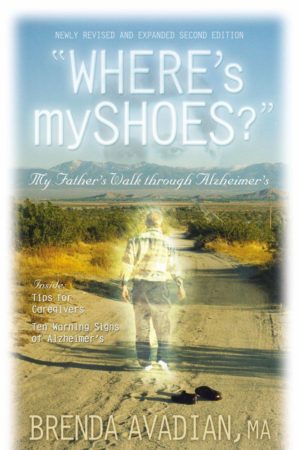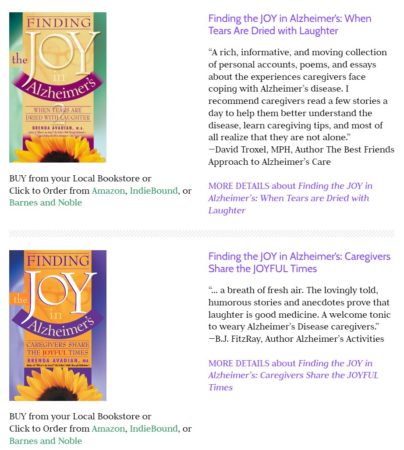Caregiver, 2024 marks the 25th anniversary of “Where’s my shoes?” My Father’s Walk through Alzheimer’s.
My father would ask repeatedly, “Where’s my shoes?” (Yes, it’s grammatically incorrect.) Having lived in the U.S. for nearly 90% of his life, he’d wear shoes inside his home. Whereas, since the 1980s and a handful of years after I moved out of my parents’ home, I adopted the Asian and Middle East tradition of leaving shoes at the door. (You’d be surprised how clean your carpets, rugs, and tile floors remain.) However, my father who was initially diagnosed with dementia, forgot about “no-shoes-in-the-house.”
As we caregivers often do, I grew weary of this question asked repeatedly. While some suggested letting him wear shoes in the house, I never wanted to hear “Where’s my shoes?” again.

Never say never.
Life has a way of making us face the things we try to push away. When the time came to choose the title for the book about his journey with Alzheimer’s, his question was the one chosen most often. We should have taken literary license and changed it to, Where are my shoes? Despite the grammatical error, this title captured the interest of both family caregivers and professionals and I was invited to speak at conferences while family caregivers hesitated to speak publicly.
Family Caregivers were Silent about Dementia in the 1990s
Family caregivers rarely spoke of their caregiving experiences for loved ones with dementia during the nineties. WOW, that was during the last century… and the last millennium! The stigma was too great for the person living with dementia and for the family. Like cancer and AIDS, we humans react with fear, initially to unknown diseases and illnesses. Consider COVID. Some families believed they had sinned or been cursed and dementia was the price they paid.
Despite the resistance to this topic, the first-edition released 25 years ago, in 1999, became a bestseller. Translated into different languages, it sold in different countries. Here’s an excerpt from the second edition, which is also currently out of print and unavailable; though you may find a copy in the secondary markets.
Excerpts from “Where’s my shoes?”
Within six months of my father moving into our home, he was involved in an Alzheimer’s drug study. One of the requirements was to keep a written record of any out-of-the-ordinary experiences. One occurred 12 hours after he was admitted into skilled nursing care—the best among a very limited number of options for care in our community at the time. This would be a test-run while we were on business travel.
The Great Escape!
[Revised] The phone rang. It was the sheriff’s deputy. My father disappeared from the nursing home. What? Did I hear that correctly? Only twelve hours after my father walked across the threshold behind secured doors and into the hands of professional caregivers? This was the worst possible news! Exhausted. Energy reserves depleted from the days prior. The thorough admissions process that morning and signing every page to cover who’s A$$? This was almost impossible to believe!
He was headed “home” on foot from north Los Angeles County to Milwaukee, Wisconsin. Dressed in only a shirt and slacks on a cold winter night, a truck driver picked him up. He was last reported walking alongside the freeway in the Mojave Desert where a Sheriff’s deputy spotted him and returned him to the skilled nursing facility where we anxiously waited.
The Garage Door… My Caaaaar!
My father had a doctor’s appointment, and I was going to take him. We got into the car and I reached over to help him put on his seat belt.
My mind was focused elsewhere. What am I’m forgetting? Do I have all his paperwork for the doctor? I hope we don’t have to wait long in the waiting room. The last time, he spoke loudly and even swore. He never swore before. There were children in the room. They looked at us. I turned the key in the ignition–starting the engine. David [my husband at the time] and I will have to make time to review Mardig’s [we called my father by his first name, Martin, in Armenian] bonds to see which bonds have stopped earning interest before year-end. Then again, he may have to pay too much in taxes already. Maybe we’ll wait to cash in the bonds until next year. I’ll ask the accountant. Oh, geez, I should have brought the papers for the accountant. I shifted into reverse. When will this end? I really need to get on with my career! This is no way to build a business. How long can David and I last like this, with so little sleep?
Then I started backing up. Thoughts swirling around my mind like a blender . . . BAM! I stopped. I wasn’t going anywhere. Damn! I had backed into the garage door! “Oh, shit!” I said aloud.
Mardig looked at me. “What was that?”
I pulled the car forward, hit the remote control to raise the garage door a little to vent the exhaust, and got out to survey the damage. It was noticeable, but nothing that needed immediate attention. “I drove into the garage door,” I answered.
“Why?”
I laughed! He asked why with such innocence, as if I had done it intentionally.
“Because I wasn’t thinking.”
“Hey, you’re driving, keep your head about you.”
He always said “Keep your head about you” when we faced a challenge or when we were overly excited or nervous.
Click on the link or video below to view the 3-minute presentation of “Overwhelmed Caregiver Runs into Garage Door”
For more, see Book Excerpts—”Where’s my shoes?”
In 25 Years—Make it FUN
We’ve come a long way during the past 25 years. We understand that dementia strikes all people; regardless of one’s life’s demographics… except, one. Sadly, most who are diagnosed are women.
Still, let’s make it FUN. That’s what I tried to do with a provocative title like Finding the JOY in Alzheimer’s featuring carefully chosen caregivers’ funny experiences with loved ones living with Alzheimer’s and other forms of dementia.
I remember an Englishman muttering disapproval as he glanced at these book titles displayed at a tradeshow. I had a bit of time before my scheduled signing, so I stopped him and we talked. He may have tempered his reaction a bit, but I believe he clung to his opinion.
 It’s our choice as caregivers to look for and savor those fleeting moments of joy. Or we can rest firmly in our melancholy of loss. Which would you prefer if you had a caregiver taking care of you?
It’s our choice as caregivers to look for and savor those fleeting moments of joy. Or we can rest firmly in our melancholy of loss. Which would you prefer if you had a caregiver taking care of you?








